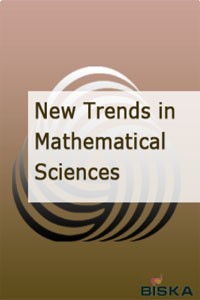Bayesian estimation for Rayleigh distribution based on ranked set sampling
Bayesian estimation for Rayleigh distribution based on ranked set sampling
___
- Al-Saleh, M. F. and Abuhawwas, J. Y. (2002). Characterization of ranked set sampling Bayes estimators with application to the normal distribution. Soochow Journal of Mathematics, 28(2), 223-234.
- Al-Saleh, M. F., Al-Shrafat, K., and Muttlak, H. (2000). Bayesian estimation using ranked set sampling. Biometrical journal, 42(4), 489-500.
- Al-Saleh, M. F. and Muttlak, H. (1998). A note on the estimation of the parameter of the exponential distribution using Bayesian RSS. Pakistan Journal of Statistics, 14, 49-56.
- Bernardo, J. and Smith, A. (1994). Bayesian Theory. Wiley, New York.
- Biradar, B.S. and Santosha, C.D. (2014).Estimation of the mean of the exponential distribution using maximum ranked set sampling with unequal samples. Open Journal of Statistics, 4, 641-649.
- Dey, S., Salehi, M., and Ahmadi, J.(2016). Rayleigh distribution revisited via ranked set sampling. METRON, DOI 10.1007/s40300-016-0099-2.
- Calabria, R. and Pulcini, G. (1996). Point estimation under asymmetric loss functions for left-truncated exponential samples. Communications in Statistics-Theory and methods, 25(3), 585-600.
- Fernandez, A. J. (2000). Bayesian inference from type II doubly censored Rayleigh data. Statistics & Probability Letters, 48(4), 393-399.
- Hartigan, J. (1964). Invariant prior distributions. The Annals of Mathematical Statistics, 35(2), 836-845.
- Helu, A., Abu-Salih, M., and Alkam, O. (2010). Bayes estimation of Weibull distribution parameters using ranked set sampling. Communications in Statistics-Theory and Methods, 39(14), 2533-2551.
- Kim, Y. and Arnold, B. C. (1999). Parameter estimation under generalized ranked set sampling. Statistics & Probability Letters, 42(4), 353-360.
- McIntyre, G. A. (1952). A method for unbiased selective sampling, using ranked sets. Australian Journal of Agricultural Research, 3(4), 385-390.
- Raqab, M. and Madi, M. (2002). Bayesian prediction of the total time on test using doubly censored Rayleigh data. Journal of Statistical Computation and Simulation, 72(10), 781-789.
- Sadek, A., Sultan, K., and Balakrishnan, N. (2015). Bayesian estimation based on ranked set sampling using asymmetric loss function. Bulletin of the Malaysian Mathematical Sciences Society, 38(2), 707-718.
- Soliman, A. A. and Al-Aboud, F. M. (2008). Bayesian inference using record values from Rayleigh model with application. European Journal of Operational Research, 185(2), 659-672.
- Varian, H. R. (1975). Bayesian approach to real estate assessment, eds. S. E. Fienberg and A. Zellner. Studies in Bayesian Econometrics and Statistics in Honor of Leonard J. Savage, 195-208. North Holland: Amsterdam.
- Wu, S.J., Chen, D.H., and Chen, S.T. (2006). Bayesian inference for Rayleigh distribution under progressive censored sample. Applied Stochastic Models in Business and Industry, 22(3), 269-279.
- Zellner, A. (1986). Bayesian estimation and prediction using asymmetric loss functions. Journal of the American Statistical Association, 81(394), 446-451.
- ISSN: 2147-5520
- Başlangıç: 2015
- Yayıncı: Biska Bilişim
Bessel collocation approach for approximate solutions of Hantavirus infection model
A Note on genus problem and conjugation of the normalizer
Bahadır Ozgur GULER, Serkan KADER
A note on double Laplace decomposition method and nonlinear partial differential equations
A Remark on the decay property for the Klein-Gordon equation in anti-de Sitter space time
Flow of a Newtonian fluid in a non-uniform wavy and permeable tube
More on cluster points of filters
Rohini JAMWAL, Renu RENU, Dalip Singh JAMWAL
Transitivity of generalized intuitionistic fuzzy matrices
Riyaz Ahmad PADDER, P. MURUGADAS
Bayesian estimation for Rayleigh distribution based on ranked set sampling
Saeid TAHMASEBİ, Elham Haji HOSSEİNİ, Ali Akbar JAFARİ
Decomposition method using He’s polynomials for Kdv Boussinesq and coupled Kdv Boussinesq equations
Jamshad AHMAD, Mariyam MUSHTAQ
Several Schur complement inequalities on block Hadamard product
